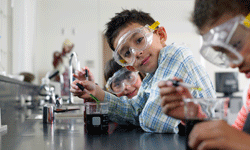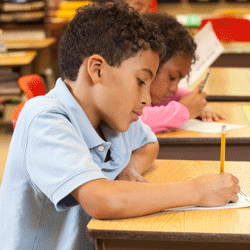Welcome to the brave new world of third grade. Some consider this the first of the "tween" years, when your child is not quite little, not quite big and might desire more independence than is warranted or wise.
At this age, typically 8 years old, they're coming into their own in academics, physical ability and society. Yes, third grade has a society. It's often the start of the more complex social structure that will follow your child to the end of school (at least). Academically, this year sees such iconic grade-school projects as memorizing state capitals, writing book reports and the baking-soda-and-vinegar volcano that messes up your kitchen.
Advertisement
Science, math, reading, writing, social development -- it's all changing this year, again, and maybe even more than it did in second grade [source: Family Education]. Here, five of the most amazing things your child will discover in the course of the third-grade year. For starters, it turns out addition and subtraction is the very tip of the iceberg ...


